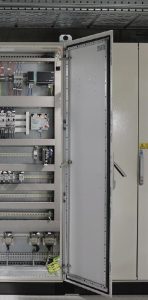
Drill ship power challenge: hybrid solution solves distribution issues
By Rittal Systems Ltd
Electronics Supply Chain energy efficiency energy efficiency hybrid solution recycling issuesAKA and Rittal collaborate to solve energy efficiency and recycling issues related to a deepwater drill ship installation.
Manufacturers in the marine and offshore space face unique challenges. Aspin Kemp & Associates (AKA), a manufacturer of electrical power and control systems headquartered in Montague, PEI, encountered one with its hybrid power initiative, the first hybrid drill floor destined for installation on ultra-deepwater drill ships operated by Transocean, Swiss offshore drilling contractors.
Before AKA’s technology, diesel generators would experience power load fluctuations in accelerating and decelerating workloads. Even a momentary loss in the main AC power source could cause difficulties in the rapid transfer of the energy needed to accommodate an unplanned disconnection of the diesel engine.
Powerful solution
AKA’s solution – to couple dieselenerators with ultracapacitors to resolve the problems in the power distribution network – called for dozens of industrial enclosures.
The intermediate power storage system absorbs and delivers energy at a rate faster than the process can use or return it. The hazards of the E-stop are controlled by allowing operation without the main generator connection. The diesel operates continuously at high output without compromising performance or requiring a ‘spinning reserve’ of power.
Enclosures for the power storage system had to exceed traditional use standards since the application is unique in the maritime and offshore market. AKA worked with Rittal Systems Ltd., a manufacturer of enclosures and racking systems. The goal was to find an enclosure system that would improve reliability, save energy, reduce emissions, lower maintenance costs, enhance safety and support maritime regulations. Since on-site modification was impossible and scrap recycling of any modifications was unacceptable, the enclosures had to arrive ready-to-install.
To meet project requirements, Rittal supplied a total of 114 TS 8 enclosures, including standard, modified and electromagnetically compatible models. The enclosures were modified prior to shipping and arrived ready to go, meeting all marine class regulations, including DNV and ABS. The TS 8s were delivered to AKA’s PEI headquarters for eventual installation in the Deepwater Thalassa at the Deawoo Shipping & Marine Engineering shipyard in South Korea. The drilling ship will be deployed in the Gulf of Mexico, but it could be sent anywhere in the world.
Impactful improvements
After months of testing and operation, AKA has catalogued a number of its hybrid power system improvements:
• The enclosures reduced fuel consumption, which lowered fuel costs and emissions.
• An effective combination of diesel and intermediate power storage reduced the release of harmful gasses into the atmosphere.
• A common bus that allows some generators to remain in standby condition rather than in constant operation reduced hours of machine wear and fouling on each generator.
• Increased standby time has reduced part wear resulting in lower replacement costs, fewer hours spent on maintenance, increased reliability and greater availability.
• The TS 8 construction reduced scaling and corrosion on wetted parts and helped retain heat transfer efficiency. This lowered maintenance hours.
• There was also a safety benefit. With fewer diesels in operation, there was a significant reduction in injuries and spills associated with fuel and other fluid handling, while smoother transitions in E-stops protected the workers from sudden engine stops.

